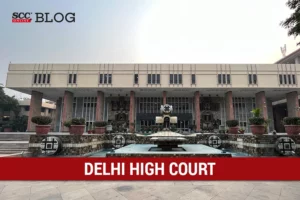Delhi High Court: In a case wherein the petition was filed under Article 226 of the Constitution praying for directing the respondent to grant all the consecutive maternity benefits to the petitioner which was applicable to regular female employees of the respondent, Chandra Dhari Singh, J.*, opined that to stand in the way of exercise of the right by a woman, without procedure or intervention of law, was not only violative of the fundamental rights granted by the Constitution but also against the basic tenets of social justice. Thus, the Court opined that the respondent should have extended the benefits and reliefs under the Act to the petitioner as were being extended to its own employees who were similarly situated.
Background
The petitioner was appointed in the Juvenile Justice Board-I, New Delhi in 2016 as a legal aid counsel on a daily fee basis. During the period of her contractual employment, the petitioner conceived a child in 2017 and hence, she applied for maternity leave of seven months, and a letter was also served upon the Member Secretary for the same. Further, an e-mail to the Delhi State Legal Services Authority (‘DSLSA'), the reply for which stated that her request for maternity benefit had been declined since there were no provision for the grant of maternity benefits for Legal Services Authorities. The petitioner being aggrieved by the decision of the respondent, had approached this Court.
Analysis, Law, and Decision
On the question of validity, the Court opine that there was nothing extraordinary or outrageous that the petitioner was seeking from the respondent. The Court opined that “maternity benefits did not merely arise out of statutory right or contractual relationship between an employer and employee but were a fundamental and integral part of the identity and dignity of a woman who chose to start a family and bear a child, which the Constitution grants its citizens under Article 21 of the Constitution”. The Court further opined that “the choice not to carry a child was an extension of the fundamental right under Article 21 of the Constitution, however, to stand in the way of exercise of this right by a woman, without procedure or intervention of law, was not only violative of the fundamental rights granted by the Constitution of India but also against the basic tenets of social justice. Even Article 15(3) of the Constitution provides that there shall be no embargo upon the State to make special provisions for women and children, which in itself is a testament to qualitative equality as stipulated under the Constitution.”.
The Court noted that the applicability of the Maternity Benefit Act, 1961 (‘Act') was discussed under Section 2 and in Section 2(1)(b) of the Act, the bare language of the statute indicated that the benefits arising out of the Act were also to be made applicable to an establishment within the meaning of law in force in a State in which ten or more persons are/were employed on any day of the preceding twelve months. The Court relied on Municipal Corpn. of Delhi v. Female Workers (Muster Roll), (2000) 3 SCC 224, wherein the Supreme Court held that maternity benefits would be extended equally across organizations, irrespective of the nature of employment of the female worker.
This Court observed that there was nothing in the language of the Act or in its provisions which suggested that a working expecting woman would be barred from getting the reliefs due to the sole reason of the nature of their employment. The Court noted that the Act which grants the reliefs to an expecting or a new mother, considers such reliefs as a ‘benefit ', when in fact the reliefs should come as a matter of right to the women employees who might be in that position. In this respect, a positive change of perspective was also required along with a more adaptive approach in the matter of grant of maternity benefits. The Court opined that the social welfare legislation of the Act certainly did not discriminate based on the nature of employment of the beneficiaries.
Thus, the Court opined that the respondent should have extended the benefits and reliefs under the Act to the petitioner as were being extended to its own employees who were similarly situated. The Court allowed the petition with the following directions:
-
The respondent shall release all medical, monetary, and other benefits that accrued in favour of the petitioner on account of her pregnancy, as per the terms of the Maternity Benefit (Amendment) Act, 2017 (‘Amendment Act').
-
Since no extreme medical or other exigencies had been presented by the petitioner, ante-natal or post-natal, she shall be entitled to the benefits for the time period as provided under the Amendment Act of 26 weeks.
[Annwesha Deb v. Delhi State Legal Services Authority, W.P.(C) 11016 of 2017, Order dated 26-07-2023]
Advocates who appeared in this case :
For the Petitioner: Dr. Charu Wali Khanna, Advocate along with petitioner in-person
For the Respondent: Mr. Sarfaraz Khan, Advocate

